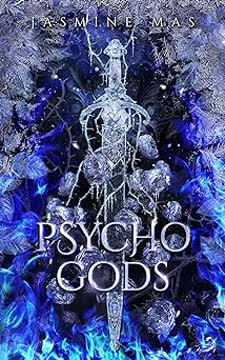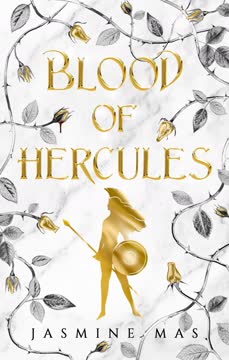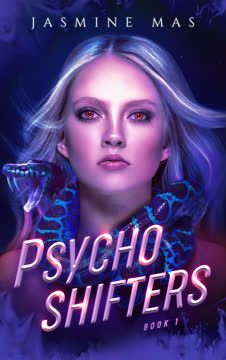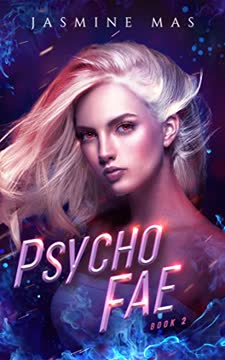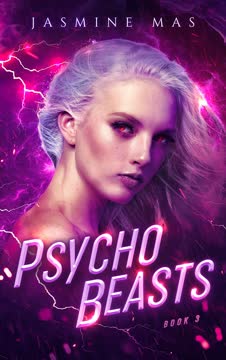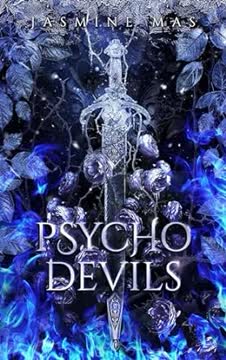Plot Summary
1. Myths, Monsters, and Power
In a multiverse where planets are connected by black holes, myths are real and monsters enforce peace. The High Court secretly rules all, using superpowered enforcers to maintain order. Aran, a traumatized angel-fae hybrid, is thrust into this cosmic game, her powers unstable and her past a source of pain. She is surrounded by enemies and would-be allies, all of whom are as broken and dangerous as she is. The stakes are nothing less than survival, as the realms face a new, monstrous threat: the ungodly, parasitic beings that threaten to consume everything.
2. Broken Wings, Broken Bonds
Aran cannot control her powers—her wings are useless, her ice magic erratic, and her sense of self is fractured by years of abuse. She is forced into leadership, haunted by the legacy of her cruel mother and the scars of her upbringing. Her relationships are fraught: she is both revered and resented by her mates, the devil kings, and the codependent twins, John and Luka. The bonds that should empower her instead bring pain, confusion, and a desperate need for healing.
3. War Games Begin
The High Court reveals the true horror: only a hundred soldiers can fight the ungodly, due to ancient peace accords. Aran and her mismatched legion—devils, shifters, angels, assassins, and more—are sent to a war camp on a hostile planet. The enemy is overwhelming, the rules are unclear, and the leadership is fractured by prejudice, trauma, and personal vendettas. Aran's role as a leader is both a burden and a test, as she must strategize, survive, and keep her legion from falling apart.
4. Therapy and Enemies
The High Court mandates therapy for Aran and her devil mates, hoping to force them into a functional unit. The sessions are a battleground of spite, confessions, and dark humor. Aran's hatred for her mates is matched only by their obsession with her. The therapy exposes the depth of their wounds—abuse, betrayal, and the impossibility of forgiveness. Yet, even in this crucible, the seeds of connection and understanding are sown.
5. The Hundred Against the Horde
The war begins in earnest. Aran, Jinx, and Malum are forced to devise plans to quietly eliminate the ungodly without alerting the planet. The infected are not mindless—they are armed, organized, and deadly. The soldiers are outnumbered a thousand to one. As the battles rage, Aran's powers remain unreliable, and the cost of every decision is measured in blood. The group's only hope lies in their willingness to use every weapon, every bond, and every ounce of cunning they possess.
6. Memory, Trauma, and Truth
Aran's memories—suppressed, stolen, and fragmented—begin to return. She recalls the truth of the ancient war, the sun god's cataclysm, and the real reason for the peace accords. The High Court's lies are exposed: the realms are not safe, and the gods are not saviors. Aran's trauma is mirrored in her mates, each of whom carries scars from their own pasts. The group's survival depends on confronting these truths, even as they threaten to tear them apart.
7. Codependency and Prophecy
The twins' codependency is revealed as both a curse and a source of strength. Their love for each other—and for Aran—fulfills an ancient prophecy: three of three, eternally. The bonds between all the main characters are tested by jealousy, pain, and the need for control. The prophecy is not a doom, but a promise: together, they are light in the darkness. Yet, the cost of such closeness is vulnerability, and the threat of loss is ever-present.
8. The High Court's Deceit
The High Court's true nature is revealed: they are not benevolent rulers, but self-serving manipulators willing to sacrifice anyone for their own ends. Jinx, Aran's guardian, is exposed as a soulmancer—an entity capable of consuming souls—who was forced to mutilate Aran's soul as part of a grand, secret plan. The leaders of the realms are not gods, but monsters in their own right, and the players in their game are all expendable.
9. Battle in the Compound
The first major battle is a slaughter. The infected are armed and organized, and the ungodly are relentless. Aran and her mates fight with everything they have, but the cost is high: soldiers die, and the survivors are left traumatized. Aran's powers begin to awaken, but they are as much a curse as a blessing. The group's only hope is to trust each other, even as old wounds and new betrayals threaten to destroy them from within.
10. Lost in the Maze
Separated from her mates, Aran is lost in the labyrinthine compound, surrounded by death and haunted by her own memories. She is forced to confront her deepest fears and the truth of her own power. When she is finally found, she is gravely wounded, and the group is forced to reckon with the reality of their situation: they are alone, outnumbered, and expendable.
11. The Price of Survival
The aftermath of battle is a time of mourning and reckoning. Funerals are held, but the High Court turns them into propaganda. The survivors are wracked with guilt and haunted by nightmares. The group's bonds are tested as they struggle to process their trauma and find meaning in the carnage. The only certainty is that the war is not over, and the worst is yet to come.
12. Nightmares and Confessions
Nightmares plague Aran and her mates, forcing them to relive their worst traumas. The truth of Aran's mutilated soul is revealed: a piece of her was stolen and given to Sadie, her best friend, as part of the High Court's machinations. The group is forced to confront the reality of their brokenness, and the only path forward is through confession, forgiveness, and the willingness to heal together.
13. The Soulmancer's Secret
Jinx confesses her role in the mutilation of Aran's soul and the High Court's grand design. She is a soulmancer, a being capable of consuming souls, and she is both victim and perpetrator. The leaders of the realms—revealed to be the sun god and moon goddess—threaten her, but she blackmails them into letting her live. The truth is out, but the danger is far from over.
14. Mates, Madness, and Healing
Aran and her mates finally accept each other, flaws and all. The corrupted bonds are healed through love, acceptance, and the willingness to be vulnerable. The group finds peace in each other, and the estate becomes a sanctuary for healing. Gifts, laughter, and the slow return of trust mark a new chapter in their lives. The trauma of war is not forgotten, but it is no longer the only story.
15. The Final Reckoning
The group faces the final stronghold of the ungodly, using their combined powers to unleash a cataclysmic storm of ice and fire. Aran's true nature is revealed: she is not just a survivor, but a force of nature, the dragon of the House of Malum. The war ends in victory, but the cost is immense. The survivors are forever changed, and the realms are left to reckon with the consequences.
16. The Aftermath of War
The survivors return to the estate, where they begin the slow process of healing. The trauma of war lingers, but the bonds between them are stronger than ever. Aran claims her place as queen, not out of ambition, but out of necessity. The group finds joy in the simple things: flying, feasting, laughter, and love. The world is not perfect, but it is theirs.
17. Gifts, Forgiveness, and Family
The story ends with weddings, gifts, and the forging of a new family. Aran, her mates, and her friends find peace in each other, even as the scars of the past remain. The High Court's machinations are not forgotten, but they are no longer the only power in the realms. The group's survival is a testament to the strength of love, the possibility of healing, and the power of choosing one's own destiny.
Characters
Aran Alis Egan
Aran is the heart of the story: a hybrid of angel and fae, marked by years of abuse at the hands of her mother and the machinations of the High Court. Her powers are immense but unstable, mirroring her fractured sense of self. She is both fierce and vulnerable, sarcastic and deeply wounded. Her journey is one of survival, healing, and the slow, painful acceptance of love and connection. Her relationships—with her mates, her friends, and her own power—are fraught with pain, but ultimately transformative. Aran's development is a testament to the possibility of healing, even for those most broken by the world.
Corvus Malum (Malum)
Malum is the Ignis, the fire king, and Aran's most volatile mate. He is driven by obsession, possessiveness, and a desperate need to protect what is his. His past is marked by abandonment and violence, and his love for Aran is both a source of strength and a dangerous compulsion. Malum's journey is one of learning to temper his fire with tenderness, to accept vulnerability, and to find peace in connection rather than domination. His devotion to Aran is absolute, and his willingness to do anything for her—vengeance, murder, or gentleness—defines his arc.
Scorpius Malum
Scorpius is the blind king, a master assassin whose world is defined by pain—both inflicted and endured. His relationship with Aran is complex: he is both her tormentor and her protector, drawn to her strength and her suffering. Scorpius's arc is one of learning to channel his darkness into love, to find meaning in connection rather than cruelty. His sadomasochism is both a coping mechanism and a barrier to intimacy, but through Aran and his mates, he learns to trust, to confess, and to heal.
Orion Malum
Orion is the quietest of the kings, a master of enchantment whose voice can enthrall or destroy. He is defined by his need to watch, to protect, and to possess. His love for Aran is gentle but intense, and his relationship with Luka reveals a new side of his character: the capacity for quiet, enduring connection. Orion's arc is one of learning to balance obsession with care, to find joy in the present, and to accept the messiness of love.
John Son of Hades (John)
John is one half of the lost princes of Olympus, defined by his codependency with his twin, Luka, and his deep love for Aran. He is playful, loyal, and fiercely protective, but his need for connection is both a strength and a vulnerability. John's arc is one of learning to expand his world beyond his twin, to accept new bonds, and to find meaning in love that is not defined by pain.
Luka Son of Hades (Luka)
Luka is the quieter, more intense twin, marked by trauma and a desperate need for connection. His love for John and Aran is absolute, and his relationship with Orion reveals a capacity for quiet, enduring intimacy. Luka's arc is one of learning to trust, to open up, and to find peace in the presence of others. His codependency is both a curse and a source of strength, and his journey is one of learning to balance need with independence.
Jinx of Lazarus
Jinx is Aran's guardian, a soulmancer forced by the High Court to mutilate Aran's soul as part of a grand plan. She is both victim and perpetrator, haunted by guilt and desperate for redemption. Jinx's arc is one of confession, forgiveness, and the slow acceptance of love and family. Her power is both a gift and a curse, and her journey is a testament to the possibility of healing even the deepest wounds.
Sadie
Sadie is Aran's closest friend, a shifter with the power to enslave others with her blood. She is loud, brash, and fiercely loyal, her humor a shield against the horrors she has endured. Sadie's arc is one of survival, forgiveness, and the forging of unbreakable bonds. Her relationship with Aran is both a source of strength and a reminder of the cost of survival.
The High Court (Dick and the Cloaked Woman)
The true antagonists of the story, the leaders of the High Court are revealed to be the sun god and moon goddess, beings of immense power and even greater cruelty. They manipulate, mutilate, and sacrifice others for their own ends, hiding behind the mask of benevolence. Their arc is one of exposure and, ultimately, the loss of their absolute power.
Horse (the Phoenix)
Horse is more than a familiar—he is a symbol of Aran's journey from trauma to healing, from death to rebirth. His transformation from a smoky crow to a phoenix mirrors Aran's own transformation, and his presence is a constant reminder that even in the ashes, new life can be found.
Plot Devices
Multiverse and Hidden Realms
The story is set in a multiverse of interconnected realms, each with its own politics, magic, and monsters. The existence of portals, black holes, and hidden rulers creates a sense of vastness and mystery. The High Court's secret rule and the true nature of the gods are slowly revealed, using foreshadowing and gradual worldbuilding to create suspense and depth.
Trauma, Memory, and Healing
The narrative is driven by the characters' traumas—abuse, betrayal, and loss—and their struggle to heal. Memory is both a weapon and a wound: Aran's stolen soul, the kings' nightmares, and the twins' codependency all serve as metaphors for the scars of the past. The story uses flashbacks, nightmares, and confessions to explore the psychological cost of survival and the possibility of healing through connection.
Corrupted Bonds and Polyamory
The central plot device is the web of bonds—romantic, platonic, and magical—that tie the characters together. These bonds are often corrupted, painful, or incomplete, mirroring the characters' own brokenness. The story uses the structure of a reverse harem, with polyamorous relationships that are as much about healing as they are about desire. The process of bonding, breaking, and healing is both literal and metaphorical, driving the characters' growth and the resolution of the plot.
The Soulmancer and the Grand Plan
Jinx's role as a soulmancer, forced to mutilate Aran's soul, is a key plot device. The High Court's grand plan, the use of players and pawns, and the manipulation of fate create a sense of inevitability and tragedy. The story uses prophecy, secret agendas, and the slow revelation of truth to build tension and drive the characters toward confrontation and, ultimately, liberation.
Humor, Satire, and Meta-Narrative
Despite its violence and trauma, the story is laced with dark humor, satire, and meta-commentary. Therapy sessions, journal prompts, and self-aware banter provide relief from the darkness and allow the characters—and the reader—to process the horror with laughter. The use of modern language, pop culture references, and irreverent tone creates a unique voice that is both engaging and subversive.
Analysis
Psycho Gods is a dark, irreverent, and deeply psychological fantasy that explores the cost of survival in a world ruled by monsters—both literal and metaphorical. At its core, the novel is about trauma: how it shapes us, how it breaks us, and how, through connection, confession, and the willingness to heal, we can begin to reclaim our power. The story subverts traditional fantasy tropes—heroes, gods, chosen ones—by revealing the corruption at the heart of power and the brokenness at the heart of its characters. Through its polyamorous relationships, it challenges the idea that love is simple or redemptive; instead, it is messy, painful, and transformative. The novel's humor and meta-narrative provide both relief and critique, inviting the reader to laugh at the absurdity of suffering and the resilience of those who endure it. Ultimately, Psycho Gods is a testament to the possibility of healing, the necessity of found family, and the power of choosing one's own destiny—even in a world designed to break you.
Last updated:
FAQ
Synopsis & Basic Details
What is Psycho Gods about?
- Cosmic War & Personal Trauma: Psycho Gods plunges readers into a multiverse where ancient myths are real, and a secret High Court governs interconnected realms. The story follows Aran Alis Egan, a traumatized angel-fae hybrid with unstable powers, as she's thrust into a seemingly unwinnable war against parasitic "ungodly" creatures threatening all existence.
- Fractured Bonds & Found Family: At its core, the novel explores Aran's journey of healing from a horrific past of abuse, navigating complex, often toxic, relationships with her fated devil mates (Corvus, Scorpius, Orion) and codependent twin princes (John, Luka). These bonds, initially a source of pain and confusion, slowly transform into a polyamorous family unit.
- Unveiling Deceit & Embracing Power: As Aran and her diverse legion fight for survival, they uncover the High Court's manipulative agenda and the true nature of the "gods" who pull their strings. Aran must confront her own inner demons, embrace her immense, terrifying power, and ultimately redefine her destiny beyond the control of others.
Why should I read Psycho Gods?
- Deep Dive into Trauma & Healing: Readers seeking a raw, unflinching exploration of trauma, its psychological impact, and the messy, non-linear path to healing will find Psycho Gods profoundly resonant. The narrative doesn't shy away from the dark realities of abuse and its lasting effects, offering a powerful message of resilience.
- Unique Polyamorous Dynamics: The book offers a complex and evolving reverse harem romance, where love is not a simple fix but a transformative journey. It delves into diverse "love languages" and challenges traditional relationship tropes, showcasing how broken individuals can find connection and acceptance in unconventional ways.
- Dark Humor & Subversive Fantasy: For those who appreciate fantasy with a sharp, irreverent edge, Psycho Gods blends intense violence and emotional depth with biting sarcasm and meta-commentary. The humor acts as a coping mechanism for both characters and readers, making the heavy themes digestible and engaging.
What is the background of Psycho Gods?
- Multiverse & Ancient Conflicts: The story is set in a vast multiverse where planets are linked by black holes, and beings from myths (shifters, fae, devils, angels, humans) coexist. This intricate world-building establishes a history of cosmic wars, including a devastating conflict with humans that led to the "Official Peace Accords" (OPA), which severely restrict the High Court's direct involvement in warfare.
- High Court's Secret Rule: The "High Court," secretly comprised of the Sun God (Dick) and Moon Goddess (the cloaked woman), maintains a hidden, oligarchic control over all realms. They manipulate individuals, referred to as "players," through prophecies, stolen memories, and engineered circumstances to serve their own political and power-driven agendas.
- Aran's Engineered Destiny: Aran's personal background is deeply intertwined with this manipulation; she is a hybrid whose soul was mutilated by a soulmancer (Jinx) at the High Court's command when she was fourteen. This act, along with her mother's abuse, shaped her powers, her perception of the world (often in shades of gray), and her initial emotional numbness, setting the stage for her reluctant role as a "player" in their grand scheme.
What are the most memorable quotes in Psycho Gods?
- "Whoever fights monsters should see to it that in the process he does not become a monster. And if you gaze long enough into an abyss, the abyss will gaze back into you.": This Nietzsche quote, a recurring motif, encapsulates the central thematic struggle of the characters, particularly Aran and the kings, as they confront their own capacity for violence and the darkness within themselves. It highlights the psychological cost of war and survival.
- "You once told me that you were the dragon of the House of Malum, and I want to tell you today that you're wrong. Aran, you're the angel of the House of Malum.": Malum's wedding vow to Aran is a pivotal moment of acceptance and redefinition. It subverts Aran's self-perception as a destructive force, acknowledging her inherent goodness and the healing she brings, while still recognizing her immense power.
- "I'm not single. I HAVE A MATE, AND SHE IS IN FRONT OF ME, LYING HER ASS OFF!": Malum's outburst in the barracks, fueled by frustration and genuine affection, perfectly captures the chaotic, passionate, and often comedic dynamic of his relationship with Aran. It highlights his possessiveness and the raw, unfiltered emotions that define their bond.
What writing style, narrative choices, and literary techniques does Jasmine Mas use?
- First-Person, Multi-POV Narrative: The story primarily uses Aran's first-person perspective, offering intimate access to her internal struggles, dark humor, and evolving emotional state. Interspersed chapters from the perspectives of other main characters (Luka, Scorpius, Corvus, John, Jinx, Orion) provide crucial insights into their motivations, shared experiences, and the complex web of their relationships, enriching the overall narrative depth.
- Dark Humor and Meta-Narrative: Mas masterfully employs dark humor, sarcasm, and meta-commentary to lighten heavy themes of trauma and violence. The characters' self-awareness, particularly in the "truth journals," creates a unique, engaging voice that acknowledges the absurdity of their situations while still exploring profound emotional truths.
- Symbolism and Foreshadowing: The narrative is rich with symbolism, such as Aran's fluctuating vision (gray to vibrant colors), the evolving form of Horse (crow to phoenix), and the elemental opposition of ice and fire (Aran and Malum). Subtle foreshadowing, like Lyla's "embrace the dragon" prophecy and Orion's "Ara constellation" revelation, builds anticipation and adds layers of meaning to the characters' destinies.
Hidden Details & Subtle Connections
What are some minor details that add significant meaning?
- Aran's Shifting Vision and Coldness: Her world turning "shades of dark blue and gray" at fourteen, coinciding with her soul mutilation, subtly symbolizes her emotional numbness and detachment. The return of vibrant colors and warmth after bonding with her mates directly reflects her healing and the filling of her "empty" soul, a key aspect of her Psycho Gods analysis.
- The Sentient Betrothal Jewelry: The enchanted Necklace of Death and diamond bracelet, initially given by the twins, are not just symbols but sentient objects that prematurely complete the soul bond due to Aran's "broken" soul. This detail explains the twins' mysterious pain and the bond sickness's unexpected resolution, highlighting the profound, almost magical, nature of their connection.
- Orion's "Ara" Constellation Revelation: Orion's quiet observation that the "Ara constellation... sits closest to Scorpius and belongs to the family of stars that includes Corvus" is a beautiful piece of symbolism explained. It subtly foreshadows Aran's fated connection to all three kings, linking her name to their celestial identities and reinforcing the idea of their intertwined destinies.
What are some subtle foreshadowing and callbacks?
- Lyla's "Embrace the Dragon" Prophecy: Early in the book, Lyla tells Aran, "You must embrace the dragon." This seemingly cryptic line is a powerful Psycho Gods foreshadowing, later revealed to mean Aran herself is the "dragon of the House of Malum," the true source of immense power, not just Malum's mate. This redefines her identity and role in the final battle.
- The "WHORE" Tattoo and its Reversal: The horrific "WHORE" carved into Aran's back by her mother is a constant reminder of her trauma. The twins' later act of getting the same tattoo to reverse the blood enchantment is a profound Psycho Gods callback and a testament to their love, symbolizing shared pain and healing. It also subtly hides Aran's "Interfecimus" tattoo, linking her past suffering to her newfound power.
- The Devil Realm's True Appearance: Malum's description of the devil realm as a place of "rolling hills and solitude" initially seems at odds with its violent reputation. This subtle detail foreshadows the reveal of the Malum estate as a bucolic sanctuary, contrasting the devils' public persona with their private desire for peace and beauty, especially for Aran.
What are some unexpected character connections?
- Luka and Orion's Quiet Bond: Beyond their shared connection to Aran, Luka and Orion develop a unique, unspoken bond. Their long, silent walks and Luka's eventual confession of interest in Orion in the truth journals reveal a deeper, unexpected emotional intimacy between two characters initially defined by their quietness and distinct obsessions. This expands the polyamorous dynamic beyond Aran.
- Malum's "Horse Girl" Persona: The revelation that Malum, the fearsome Ignis, secretly rescues miniature ponies and goats, adorning them with bows, is a surprising and endearing character connection. This hidden detail humanizes his often-brutal exterior, revealing a softer, almost childlike side that contrasts sharply with his "Mitch" nickname and his aggressive Corvus Malum motivations.
- Jinx's Familial Ties to the Shifters: Jinx's adoption into Jax's family, initially a High Court manipulation, evolves into a genuine familial bond. Despite her soulmancer nature and the trauma she inflicted, Jax's fierce protectiveness and Jinx's eventual confession of love for him highlight an unexpected, deeply emotional connection that transcends the High Court's machinations.
Who are the most significant supporting characters?
- Jinx of Lazarus: As Aran's guardian and the soulmancer responsible for her soul mutilation, Jinx is a pivotal supporting character. Her internal conflict, forced servitude to the High Court, and eventual blackmail of the gods reveal the depth of the manipulation and her own journey from pawn to powerful, independent agent. Her unique abilities and tragic backstory are central to understanding the overarching plot.
- Sadie: Aran's best friend and emotional anchor, Sadie provides crucial comedic relief and unwavering loyalty. Her blood-enslavement powers, while initially disturbing, become a tool for protection. Her role in Aran's healing, her unfiltered honesty, and her own journey of finding love and acceptance within her shifter mates make her an indispensable part of Aran's support system.
- Lothaire: Aran's biological father, the vampyre commander, evolves from a distant, seemingly cruel figure to a proud, supportive parent. His subtle acts of care (giving the RJE device, mouthing encouragement, expressing pride) and his eventual confession of regret for abandoning Aran reveal a complex character who, despite his violent nature, genuinely cares for his daughter. His presence highlights themes of unexpected family and forgiveness.
Psychological, Emotional, & Relational Analysis
What are some unspoken motivations of the characters?
- Aran's Pursuit of Numbness: Beyond her stated desire for peace, Aran's constant drug use, sarcasm, and self-deprecating humor are unspoken coping mechanisms to maintain emotional numbness. Her "Clinomania" (morbid sleepiness) and desire to "disappear" are driven by a deep-seated fear of feeling the pain of her past and the overwhelming responsibility of her power, a key aspect of Aran motivations.
- The Kings' Need for Control and Validation: Malum's possessiveness, Scorpius's sadism, and Orion's enthrallment are rooted in a profound need for control and validation, stemming from their own traumas and the devil realm's brutal culture. Their obsession with Aran is an unspoken attempt to fill their own voids and prove their worth, both to themselves and to the sun god, making their Corvus Malum motivations and Scorpius Malum motivations deeply psychological.
- The Twins' Fear of Separation: John and Luka's extreme codependency and fierce protectiveness of Aran are driven by an unspoken, primal fear of separation, born from their traumatic childhood and brief forced separation. Their willingness to endure pain from the corrupted soul bond and their desperate attempts to keep Aran close reveal a deep-seated anxiety about loss, central to John motivations and Luka motivations.
What psychological complexities do the characters exhibit?
- Aran's Eccedentesiast Persona: Aran embodies the definition of an "eccedentesiast," hiding her profound pain and trauma behind a facade of sarcasm, indifference, and dark humor. Her internal monologue often contradicts her outward behavior, revealing a complex struggle between her desire for emotional detachment and her innate capacity for empathy and connection, a core element of Psycho Gods character analysis.
- Scorpius's Sadomasochistic Coping: Scorpius's preference for pain, both inflicted and received, is a complex psychological coping mechanism for his own trauma and blindness. His sadism is not purely malicious but a distorted way of feeling control and connection, as revealed in his journal entries where he equates pain with care and pleasure, offering a unique perspective on Scorpius Malum motivations.
- Malum's Duality of Rage and Tenderness: Corvus Malum exhibits a striking psychological duality, oscillating between explosive rage and surprising tenderness. His "horse girl" persona, his earnest apologies, and his deep emotional vulnerability in the truth journals contrast sharply with his violent outbursts and possessiveness, showcasing a man struggling to reconcile his inherent nature with his desire to protect and cherish Aran.
What are the major emotional turning points?
- Shared Trauma Memories: The moment the kings and twins experience Aran's childhood torture nightmares through the bond sickness is a major emotional turning point. This shared suffering forces them to confront the depth of her trauma, shifting their perception of her from a "Revered" to a deeply wounded individual, and fueling their desire for vengeance and protection.
- Aran's Confession of Soullessness: Aran's raw confession to Sadie and later to her mates that she is "missing a piece of her soul" is a critical emotional turning point. This vulnerability allows her to articulate her deepest fear and the source of her emotional numbness, paving the way for her mates to accept her "flaws and all" and actively work towards her healing.
- The Wedding Vows and Acceptance: The wedding ceremony, particularly Corvus's heartfelt vows and Orion's declaration of Aran as their "angel," marks a profound emotional turning point. It signifies the collective acceptance of Aran's true self, her power, and her brokenness, solidifying their polyamorous bond as a source of unconditional love and healing, rather than just fated obligation.
How do relationship dynamics evolve?
- From Antagonism to Unbreakable Unit: The relationship between Aran and her mates evolves from intense antagonism and forced proximity (therapy sessions) to a deeply bonded, polyamorous family. Initially, the kings torment Aran, and the twins are her sole comfort. However, through shared trauma, confessions, and mutual vulnerability, they gradually learn to trust, support, and love each other, forming an "unbreakable unit" by the end of the story.
- Redefining "Revered" and "Protector": The traditional devil concepts of "Ignis" and "Protector" are redefined through Aran's influence. The kings learn that true protection involves emotional support and understanding, not just physical dominance or control. Aran, in turn, accepts their protective instincts, but on her own terms, transforming the dynamic from subservience to mutual respect and shared power.
- Expanding Codependency to Polyamory: The twins' initial codependency, focused solely on each other, expands to include Aran, and eventually, the kings. This evolution is not a dilution but an enrichment, as Luka finds a quiet connection with Orion, and John develops a playful, yet intense, dynamic with Scorpius. The polyamorous structure allows for diverse forms of love and support, healing old wounds and creating new bonds.
Interpretation & Debate
Which parts of the story remain ambiguous or open-ended?
- The True Nature of the High Court/Gods: While Dick and the cloaked woman are revealed as the Sun God and Moon Goddess, their ultimate motivations and the full extent of their power remain somewhat ambiguous. Jinx questions if they are "omnipotent figures ruling over the masses, or if they were frauds masquerading as something greater than themselves," leaving the reader to ponder the true nature of divinity and power in the realms.
- The Future of the Realms: Despite the war's end and Aran's reclamation of the fae throne, the long-term political stability of the realms is left open-ended. The High Court's continued existence, Jinx's blackmail, and the lingering effects of their manipulation suggest that future conflicts and power struggles are inevitable, leaving the characters' hard-won peace potentially fragile.
- The Full Extent of Aran's Healing: While Aran experiences significant healing and finds love, the narrative acknowledges that her trauma is "permanently" ingrained, and she still experiences "panic and spiral" moments. The story ends with a sense of ongoing recovery, implying that healing is a continuous process rather than a definitive endpoint, leaving the depth of her future emotional well-being open to interpretation.
What are some debatable, controversial scenes or moments in Psycho Gods?
- The Kings' Vengeance on Fae Guards: The kings' decision to hunt down and brutally murder the fae guards who tortured Aran, displaying their corpses on pikes, is a highly debatable moment. While presented as an act of love and protection, it raises questions about the morality of vengeance and whether their actions make them "monsters" themselves, echoing Nietzsche
Review Summary
Psycho Gods received mixed reviews. Many readers enjoyed Aran's character development and humor, as well as her interactions with Sadie. However, some felt the plot was rushed and underdeveloped, particularly regarding the war and relationship dynamics. Critics noted inconsistencies in character behavior and pacing issues. Despite these concerns, fans of the series found it entertaining and addictive, praising the author's ability to create engaging, if flawed, characters. The book's length and resolution of ongoing plotlines were points of contention among readers.
Download PDF
Download EPUB
.epub digital book format is ideal for reading ebooks on phones, tablets, and e-readers.
